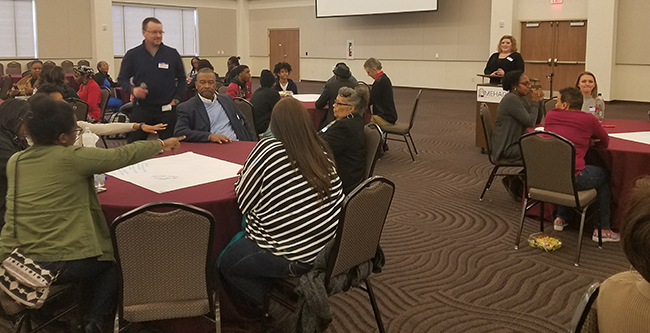
Photo submitted
North Nashville community organizations gather at the Cal Turner Family Center at Meharry Medical College to screen Resilience.
NASHVILLE, Tenn. Childhood experiences, both positive and negative, are a major influence on lifelong health. According to researchers, abuse and neglect create toxic stress that can trigger hormones to wreak havoc on the brains and bodies of children. This, in turn, puts them at greater risk for disease, homelessness, prison time and early death.
As such, Adverse Childhood Experiences (ACEs) are an important public health issue.
Resilience
Community organizations in North Nashville gathered at the Cal Turner Family Center at Meharry Medical College (MMC) in March 2018 to screen Resilience, a health documentary based around the science of ACEs and the people throughout the United States leading the charge to combat its negative effects.
The film chronicles the dawn of a movement determined to fight back. Pediatricians, educators and social workers use cutting-edge science and field-tested therapies to protect children from the effects of toxic stress.
World Café Method
Jared Elzey, Project Manager of Meharry Research Concierge Services (MeRCURY), represents MMC on the All Children Excel (ACE) Nashville, and he helped organize the World Café that held the screening.
“It was MMC members of that group who supported the Resilience World Café Project,” he said. “The World Café method enables communities to come together and have personal conversations about important questions.”
According to Elzey, attendees propose key questions and groups discuss them at small tables. Notes from those discussions are then collected and given back to the community a few weeks later to gauge its needs and opinions regarding those questions.
“To build momentum on resolving concerns in the community,” Elzey explained.
Looking ahead
Going forward, Elzey hopes the screening’s attendees will become more active in ACE Nashville and more aware of ACEs’ impact on health and the community. He and other community advocates are considering expanding the program once data from the World Café is collected.
“That’s when we’ll continue conversations with participants about whether they’d like to expand the film screenings or the World Café Method,” he said.
About the Meharry-Vanderbilt Alliance
Founded in 1999, the Alliance bridges the institutions of Meharry Medical College and Vanderbilt University Medical Center. Its mission is to enrich learning and advance clinical research in three primary areas -- community engagement, interprofessional education and research -- by developing and supporting mutually beneficial partnerships between Meharry Medical College, Vanderbilt University Medical Center and the communities they serve. Through community engagement, the Alliance serves a large community of stakeholders including surrounding universities and colleges, community organizations, faith-based outlets and community health centers. Its interprofessional education enhances students' interdisciplinary understanding and improves patient outcomes through integrated care. The research conducted provides access to experienced grant writers and materials supporting the grant application process and facilitates grant-writing workshop.




